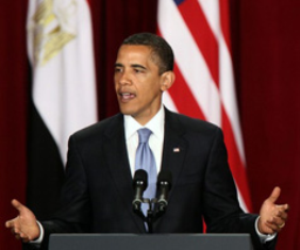By George E. Sekeris
The Libyan crisis has once more brought to the fore criticism of President Obama from both sides of the political spectrum for a supposed lack of firm strategic and ideological guidelines in the conduct of his foreign policy. By expounding, however, in his March 28th speech what is already called the “Obama doctrine”, the American president succeeded in largely refuting these allegations.
The crux of this doctrine – which, one should hasten to add, does not greatly differ in substance from the policies of Mr. Obama’s predecessor, or indeed predecessors – lies in the distinction between, on one hand, America’s “core interests”, mainly centered on the “safety” of the nation and its “allies”, and, on the other hand, its other “interests and values”. The corollary being that in the former case, which expressly includes the “fight in Afghanistan” and “going after al Qaeda”, the American President “will never hesitate to use our military swiftly, decisively, and unilaterally when necessary”; while in the latter, with Libya cited as an example, “we should not be afraid to act -– but the burden of action should not be America’s alone”.
Yet, formulating a doctrine is often simpler than putting it into practice – as the Libyan venture clearly shows. The limited use of force in the service of limited objectives – “protecting civilians” with “no boots on the ground” – can lead to ambiguous and potentially dangerous outcomes. Under the pressure brought to bear upon him by the Western coalition and its Arab partners, Kaddafi may of course crumble. But what if he does not? Will the US persist in its “supportive role”, leaving the heavy lifting to France and Britain? And if these two powers prove unable to unseat the Libyan dictator, will America raise its military ante – notwithstanding President Obama’s public assurances to the contrary, and the even more unambiguous insistence of Defense Secretary Gates (interviewed by Brett Stephens in Wall Street Journal, March 27th, 2011) that “Libya is not a vital national interest of the United States”? And to what level?
The danger inherent in the present Libyan situation is that Kaddafi, though unable to crush the insurgency as long as it is actively supported from abroad, may nevertheless, in the absence of an all-out American led Western military campaign, succeed in holding on to a large swathe of his country; and that the ensuing civil war could prove the breeding ground for anti-Western extremists not only in Libya, but elsewhere in the Arab world as well.
To avert such ominous developments the West has basically two options: To step up the military pressure, going beyond the constraints set by UN resolution 1973 and eventually putting in one way or another “boots on the ground”, with a view to ousting Kaddafi; or to seek an accommodation with him. In other words, Western leaders will have to choose between regime change with its attendant risks and a humiliating negotiation with a man whose removal from power they have presented repeatedly – most recently in London – as their firm wish and implied aim.
At any rate, the stakes for the Western world in Libya are constantly rising.
Fearful at first of a humanitarian catastrophe and subsequently goaded by his French and British allies – and, if one judges from his initial reactions, against his better instincts – president Obama risks letting Washington be drawn ever more deeply into a Libyan morass. And at a personal level, initiating a third Middle Eastern war in a country that avowedly does not represent a vital national security interest to the United States could very well cost him the Presidency a year and a half from today.
Even more exposed politically is the French president. His high profile belligerence on the Libyan issue was no doubt prompted in large part by the hope that it will help shore up his failing popularity at home. But the fact is that, whereas M. Sarkozy is not at all certain to win the next presidential election even if his Libyan gambit succeeds, his political fortunes are sure to plummet if it fails.
Failure in Libya will also carry serious consequences for the British prime minister and his government, given that in the Libyan case Mr. Cameron has chosen to follow the French lead – perhaps in an effort to atone for his country’s recent murky deals with the Kaddafi regime, and no doubt in order to safeguard British economic interests in the rapidly changing Libyan geopolitical landscape.
And, obviously, much hangs in the balance for NATO as an institution. Despite initial French and Turkish objections and German reluctance, the Alliance has been brought in as the deus ex machina for achieving a coordination of efforts otherwise unattainable, once the U.S. had made it clear it would not remain, openly at least, at the helm. And in these circumstances, inability to achieve an acceptable solution of the Libyan problem may well undercut NATO’s future as an instrument of “peacemaking” beyond the European continent – and even within it.
It should finally be noted that the Libyan crisis has already had its first major victim. Coming in the wake of last November’s divisive Anglo-French Defense Treaty, it has laid bare the EU’s inability to act as a unified force in a matter of direct concern to most of its members – and has thus struck a further, heavy blow to the ailing common European foreign and defense policy.
For the rest, the course of events in Libya has shown once more that, in spite of the facile theorizing about the end of American preeminence in a multipolar world, the United States continues to be, as Madeleine Albright has famously put it, “the indispensable nation”.



















